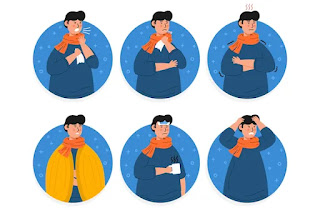Cough: Causes, Symptoms and Treatment
Unraveling the Mystery Behind Cough: Causes, Symptoms and Treatment.
Coughing is an everyday occurrence, a reflex action that helps our bodies remove irritants from the airways.
While cough is usually a benign symptom, it can also be an indicator of an underlying health problem.
From the common cold to more serious respiratory conditions, understanding the causes, symptoms, and treatments for coughs can enable us to take better care of ourselves and those around us. In this blog, we'll delve into the world of coughing, exploring the different aspects of this common yet mysterious respiratory response.
Understanding Cough:
Coughing is a natural defense mechanism designed to protect our airways. When irritants such as dust, smoke or mucus accumulate in the throat and respiratory tract.
Train signals the respiratory muscles to contract forcefully, expelling these irritants through a sudden burst of air. Coughing also helps clear excess mucus from the airways, keeping them clear and preventing infection.
Lasting less than three weeks, an acute cough is often associated with a viral infection such as the common cold or flu. It may also be accompanied by other symptoms like sneezing, runny nose and sore throat.
2. Sub-acute cough:
Asub-acute cough lasting three to eight weeks is usually associated with a respiratory tract infection that takes longer to heal.
3. Chronic cough:
A cough that lasts for more than eight weeks is considered a chronic cough. This could be a sign of an underlying health condition that requires a medical attention
*due to cough .
1. Infections:
Viral infections, such as influenza virus or respiratory syncytial virus (RSV), are common causes for acute cough.A prolonged cough can also be caused by a bacterial infection, such as bronchitis or pneumonia.
2. Allergies:
An allergic reaction to substances such as pollen, pet dander, or mold can cause a cough, which is often accompanied by sneezing and a runny nose.
3. Environmental irritants:
Exposure to pollutants, cigarette smoke, or strong odors can cause a chronic cough, especially in individuals with sensitive airways.
4. Asthma:
People with asthma often experience coughing attacks along with wheezing and shortness of breath due to inflammation in the airways.
5. Gastroesophageal reflux disease (GERD):
Stomach acid flowing back into the esophagus can cause a cough, especially at night.
6. Postnasal Drip:
Excessive mucus dripping from the back of the nose into the throat can lead to a chronic cough.
7. Respiratory conditions:
Chronic obstructive pulmonary disease (COPD), bronchitis and lung infections are among the more serious conditions that can cause a persistent cough.
The symptoms that accompany a cough can provide valuable information about its underlying cause:
symptoms associated with cough.
1. Fever and chills (infection)
2. Wheezing and shortness of breath (asthma)
3. Heartburn and vomiting (GERD)
4. Nasal congestion and sneezing (allergies)
5. Fatigue and chest discomfort (chronic respiratory conditions)
Management and treatment of cough.
1. Stay hydrated:
Drinking plenty of fluids helps keep the respiratory tract moist and can reduce irritation.
2. Moist the air:
Using a humidifier can add moisture to the air, which can reduce dryness of the throat and cough.
3. Avoid Irritating Substances:
Minimize exposure to smoke, pollutants and other environmental irritants.
4. Over-the-counter medications:
Cough suppressants can provide temporary relief for bothersome coughs, while expectorants help loosen mucus.
5. Honey:
Natural honey has soothing properties and can help ease the symptoms of cough, especially for babies above one year of age.
6. Garling with salt water:
Gargling with warm salt water can reduce sore throat and reduce cough.
When to seek medical help.
While most coughs get better on their own, if:
1. Cough persists for more than three weeks.
2. You experience severe chest pain or difficulty in breathing.
3. Coughing up blood-like mucus or weight loss without any reason.
4. Cough with high fever or night sweats.
conclusion
Coughing is a natural response that helps protect our airways, but it can also be a symptom of a variety of health conditions.Understanding the causes, symptoms, and treatments of cough empowers us to take appropriate action in managing and treating this common but often misunderstood respiratory response.
Although many coughs are harmless and get better with time, it is important to pay attention to persistent or severe coughs and seek medical advice when needed to ensure optimal respiratory health. Remember, taking care of your respiratory system is an investment in your overall well-being. Stay informed, stay healthy!
FAQs About Cough:
1. What are the common causes of coughing?
Coughing can be triggered by various factors.
Common causes include viral infections like the common cold or flu, allergies to substances like pollen or pet dander, exposure to environmental irritants such as smoke or pollutants, asthma, GERD (gastroesophageal reflux disease), postnasal drip, and chronic respiratory conditions like COPD or bronchitis.
2. When should I seek medical attention for a cough?
2. When should I seek medical attention for a cough?
While most coughs are harmless and resolve on their own, certain situations warrant medical evaluation.
Seek medical attention if your cough persists for more than three weeks, is accompanied by severe chest pain or difficulty breathing, produces blood-tinged mucus, leads to unexplained weight loss, or is associated with a high fever or night sweats.
3. Can I use over-the-counter cough medications to treat my cough?
3. Can I use over-the-counter cough medications to treat my cough?
Over-the-counter cough medications can provide temporary relief for an irritating cough. Cough suppressants can help suppress the urge to cough, while expectorants can help loosen mucus and make it easier to expel.
However, it's essential to read the labels and follow the recommended dosage instructions. If you have other health conditions or are taking other medications, consult your healthcare professional before using over-the-counter remedies.
4. How can I soothe a persistent cough at home?
There are several home remedies that can help soothe a persistent cough:
- Stay hydrated by drinking plenty of fluids to keep the respiratory tract moist.
- Use a humidifier to add moisture to the air and reduce throat dryness.
- Avoid environmental irritants like smoke and pollutants.
- Honey, especially for children above one year old, has natural soothing properties.
5. Are there specific cough remedies for children?
For children under one year of age, it's best to consult a pediatrician before using any cough remedies.
4. How can I soothe a persistent cough at home?
There are several home remedies that can help soothe a persistent cough:
- Stay hydrated by drinking plenty of fluids to keep the respiratory tract moist.
- Use a humidifier to add moisture to the air and reduce throat dryness.
- Avoid environmental irritants like smoke and pollutants.
- Honey, especially for children above one year old, has natural soothing properties.
5. Are there specific cough remedies for children?
For children under one year of age, it's best to consult a pediatrician before using any cough remedies.
For children above one year old, honey can be a natural and safe option to alleviate cough symptoms. However, always follow your pediatrician's advice and avoid giving over-the-counter medications without their recommendation. If a child's cough is severe or persists, seek medical attention promptly.








Post a Comment